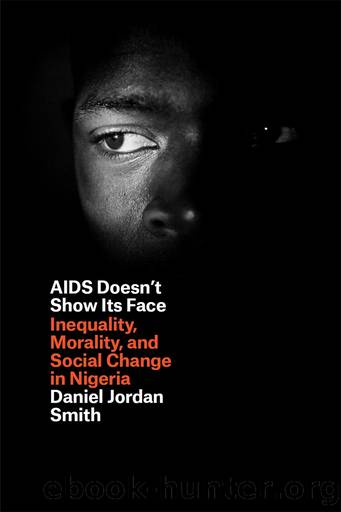AIDS Doesn't Show Its Face by Daniel Jordan Smith

Author:Daniel Jordan Smith [Smith, Daniel Jordan]
Language: eng
Format: epub
ISBN: 9780226108834
Barnesnoble:
Publisher: University of Chicago Press
Published: 2014-03-28T00:00:00+00:00
8. The Nigerian media both reflect and contribute to popular perceptions that AIDS NGOs created to address the epidemic are boondoggles for their founders.
That people afflicted with HIV or AIDS can be placed under a further cloud of suspicion if they speak out about their status or simply participate in programs designed to help them highlights the extent and power of such stigma. But these rumors are more than manifestations of stigma; they are also a form of political critique. They are the product of widespread recognition and anger about the fact that many NGOs ostensibly created to address the epidemic are shamsâfraudulent enterprises created to benefit from humanitarian AIDS money. People also know that even among those NGOs that are legitimate, many of their founders and staff receive handsome compensation for their good works (with expatriate employees of international NGOs exemplifying most obviously just how well one can do by âdoing goodâ). Further, HIV-positive men and women who are receiving antiretroviral therapy or participating in donor-funded support groups and prevention programs are often receiving resources that are the envy of others. Envy about this form of âtherapeutic citizenshipâ (Nguyen 2010)âthe idea that people can demand and get access to rights and benefits of the state because of their health status, often in circumstances where they otherwise have little sway with their governmentsâis more a commentary on the precarious circumstances of ordinary Nigerians than on the extent of benefits accruing to people who are HIV positive.
At the heart of the widespread perception of NGO fraud is a lack of trust that feeds on decades of local experiences with corrupt and ineffective donor- and state-sponsored development interventions (Smith 2007a). With good reason, ordinary Nigerians do not always believe that the West has their interests at heart; they do not trust their government; and they often suspect the motives of their fellow citizens. Just as AIDS itself is seen as the consequence of moral crisis, so too are the efforts to combat it tainted with the perception that they are enterprises of greed and self-aggrandizement. But to divide Nigerian civil societyâs responses to the epidemic neatly into honest and corrupt NGOs, or Nigeriaâs HIV-positive population into innocent victims and opportunistic entrepreneurs, is far too simplistic. Nearly every NGO and NGO leader, regardless of how crooked or honest he or she might be, is caught up in popular critical moral discourses about the way these organizations exploit and exacerbate inequality. Much can be learned about the popular perceptions and political effects of these institutions by examining cases in which AIDS NGOs and their leaders are considered by Nigerians to be more or less corrupt. These organizations ostensibly operate to serve society, often especially the most vulnerable populations, with an implicitly moral mandate. But they frequently become embroiled in accusations of corruption that reveal the changing dynamics of inequality and morality as the very fabric of social relations in Nigeria is undergoing significant transformations.
A Poser, an NGO, and the Politics of Patronage
In the mid-1990s,
Download
This site does not store any files on its server. We only index and link to content provided by other sites. Please contact the content providers to delete copyright contents if any and email us, we'll remove relevant links or contents immediately.
| Central Africa | East Africa |
| North Africa | Southern Africa |
| West Africa | Algeria |
| Egypt | Ethiopia |
| Kenya | Nigeria |
| South Africa | Sudan |
| Zimbabwe |
Goodbye Paradise(3810)
Men at Arms by Terry Pratchett(2838)
Tobruk by Peter Fitzsimons(2518)
Borders by unknow(2315)
Arabs by Eugene Rogan(2299)
Pirate Alley by Terry McKnight(2221)
More Than Words (Sweet Lady Kisses) by Helen West(1867)
Belonging by Unknown(1859)
It's Our Turn to Eat by Michela Wrong(1731)
The Biafra Story by Frederick Forsyth(1656)
The Source by James A. Michener(1613)
Botswana--Culture Smart! by Michael Main(1602)
Coffee: From Bean to Barista by Robert W. Thurston(1547)
A Winter in Arabia by Freya Stark(1538)
Gandhi by Ramachandra Guha(1532)
The Falls by Unknown(1527)
Livingstone by Tim Jeal(1489)
The Shield and The Sword by Ernle Bradford(1409)
Africa: Altered States, Ordinary Miracles by Richard Dowden(1385)
